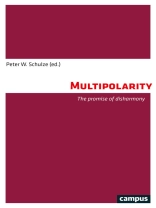Wir leben in einer Übergangszeit: Die unipolare Weltordnung unter hegemonialer Durchsetzungskraft der USA weicht einer multipolaren Ordnung. Diese neue Ordnung verfügt weder über einen umfassenden gesellschaftspolitischen Konsens noch basiert sie auf gefestigten Institutionen. Sie ist weitestgehend durch partikulare Interessen bestimmt. Deshalb müssen wir annehmen, dass sie kaum in der Lage sein wird, territoriale Sicherheit und friedliche Entwicklungsmöglichkeiten zu gewährleisten. In diesem Prozess scheint die Europäische Union, aber – mit Einschränkungen – auch Russland, zwischen China und die USA zu geraten.
สารบัญ
Contents
Foreword 7
Peter W. Schulze
Multipolar prospects amid multiple challenges:
Resurgent nationalism and declining US leadership 13
Richard Falk
Part I: Central elements of an emerging world order
The international system and the clash of world orders 27
Richard Sakwa
Looming threat: The decay of the existing international order 53
Jia Qingguo
A new world order: A view from Russia 59
Sergey Karaganov and Dmitry Suslov
Post-Western world orders 83
Raffaele Marchetti
Part II: Building blocks, drivers, and perspectives
The global revolt against the liberal world order 103
Adrian Pabst
A world in transition: Views from Russia, the US, and the EU
on the challenges of multipolarity 127
Peter W. Schulze
Greater Europe: Internal and external threats to security 161
Alexey Gromyko
The European Union’s African challenge: An unknown quantity
in tomorrow’s world order 175
Winfried Veit
Europe at a crossroads: Less is more 189
Walter Schwimmer
Part III: Outlook: Eurasia’s further diffusion of power?
Beyond China: The return of the Eurasian order 211
Jacopo Maria Pepe
Notes on contributors 229
Index 232
เกี่ยวกับผู้แต่ง
Peter W. Schulze ist Privatdozent für Internationale Politik an der Universität Göttingen und Gründungsmitglied des DOC RI Berlin.












